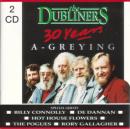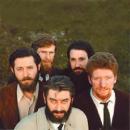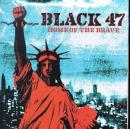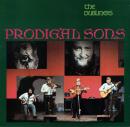Ó, bliain is lá amárach
Sea d'fhágas an baile
A' dul go hArd Pádraig,
'Cur lásaí le m' hata.
Bhí Buachaillí Bána ann
Is rás acu ar Eallaibh,
Is mé go dubhach uaigneach
I bpríosún Cluain Meala
Tá mo shrian is mo dhiallait
Ar iasacht le fada.
Mo chamán ar fiaradh
Faoi iarthar mo leapa,
Mo liatróid dá bualadh
Ag buachaillí an ghleanna -
Is go mbuailfinn poc báire
Chomh hard leis na fearaibh!
A Chiarraigh bígí ' guí liom,
Is bog binn liom bhur nglórtha,
Is beag a shíleas-sa choíche
Ná béarfainnse beo oraibh:
Go mbeidh ár dtrí cinn-ne
Ar trí spící mar sheó acu,
Faoi schneachta na hoíche,
Is gach síon eile á ngeobhaidh chugainn!
Go hUíbh Ráthach má théann tú,
Beir scéala go dtí mo mhuintir
Go bhfuilim daor ar an bhfód seo
Is nach bhfuil beo agam
Ach go hAoine.
Bailídh gléas tórraimh
Agus cónra bhreá im thimpeall -
Sin críoch ar Ó Dónaill
Is go deo bídh ag guí leis.
Sea d'fhágas an baile
A' dul go hArd Pádraig,
'Cur lásaí le m' hata.
Bhí Buachaillí Bána ann
Is rás acu ar Eallaibh,
Is mé go dubhach uaigneach
I bpríosún Cluain Meala
Tá mo shrian is mo dhiallait
Ar iasacht le fada.
Mo chamán ar fiaradh
Faoi iarthar mo leapa,
Mo liatróid dá bualadh
Ag buachaillí an ghleanna -
Is go mbuailfinn poc báire
Chomh hard leis na fearaibh!
A Chiarraigh bígí ' guí liom,
Is bog binn liom bhur nglórtha,
Is beag a shíleas-sa choíche
Ná béarfainnse beo oraibh:
Go mbeidh ár dtrí cinn-ne
Ar trí spící mar sheó acu,
Faoi schneachta na hoíche,
Is gach síon eile á ngeobhaidh chugainn!
Go hUíbh Ráthach má théann tú,
Beir scéala go dtí mo mhuintir
Go bhfuilim daor ar an bhfód seo
Is nach bhfuil beo agam
Ach go hAoine.
Bailídh gléas tórraimh
Agus cónra bhreá im thimpeall -
Sin críoch ar Ó Dónaill
Is go deo bídh ag guí leis.
inviata da The Lone Ranger - 7/5/2010 - 13:47
Lingua: Inglese
Versione inglese ottocentesca del poeta iralndese Jeremiah Joseph Callanan.
THE GAOL OF CLONMALA
How hard is my fortune
And vain my repining
The strong rope of fate
For this young neck is twining!
My strength is departed,
My cheeks sunk and sallow,
While I languish in chains
In the gaol of Clonmala.
No boy of the village
Was ever yet milder;
I'd play with a child
And my sport would be wilder;
I'd dance without tiring,
From morning 'till even.
And the goal-ball I'd strike
To the light'ning of Heaven.
At my bed foot decaying
My hurl-bat is lying;
Through the boys of the village
My goal-ball is flying;
My horse 'mong the neighbours
Neglected may fallow,
While I pine in my chains
In the gaol of Clonmala.
Next Sunday the patron
At home will be keeping
And the young active hurlers
The field will be sweeping;
With the dance of fair maidens
The evening they'll hallow,
While this heart once so gay
Shall be cold in Clonmala.
How hard is my fortune
And vain my repining
The strong rope of fate
For this young neck is twining!
My strength is departed,
My cheeks sunk and sallow,
While I languish in chains
In the gaol of Clonmala.
No boy of the village
Was ever yet milder;
I'd play with a child
And my sport would be wilder;
I'd dance without tiring,
From morning 'till even.
And the goal-ball I'd strike
To the light'ning of Heaven.
At my bed foot decaying
My hurl-bat is lying;
Through the boys of the village
My goal-ball is flying;
My horse 'mong the neighbours
Neglected may fallow,
While I pine in my chains
In the gaol of Clonmala.
Next Sunday the patron
At home will be keeping
And the young active hurlers
The field will be sweeping;
With the dance of fair maidens
The evening they'll hallow,
While this heart once so gay
Shall be cold in Clonmala.
inviata da The Lone Ranger - 7/5/2010 - 13:49
×
![]()







Testo trovato qui
L’originale settecentesco, di autore anonimo, fu ripreso da Pádraig Pearse (1879-1916), scrittore e poeta irlandese, noto per essere stato uno dei leader dell’insurrezione repubblicana della Pasqua del 1916, nel corso della quale trovò la morte. La versione inglese fu invece scritta circa un secolo prima da Jeremiah Joseph Callanan (1795–1829), poeta irlandese originario di Cork.
Questa canzone si riferisce proprio alle ultime ore di un membro dei Whiteboys, catturato e condannato ad essere impiccato (e poi decapitato e/o squartato, come si usava fare in quei tempi gentili). Nel 1761 i landlords mandarono le loro milizie e i soldati contro i Whiteboys e nell’arco di un paio d’anni ne disarticolarono l’organizzazione. Centinaia morirono nei rastrellamenti, molti altri furono giustiziati, e fra loro il reverendo cattolico Nicholas Sheehy, impiccato a Clonmel nel 1766, che per anni si era battuto strenuamente contro le leggi penali inglesi, contro la cacciata dei contadini dalle terre, contro gli affitti e le tasse esose e contro l’eliminazione della proprietà collettiva.
Più tardi, anche grazie alla repressione e al “divide et impera” che sempre funziona egregiamente, quelle organizzazioni nate per l’autodifesa contro i potenti si trasformarono purtroppo in bande di cattolici e di protestanti (l’ordine di Orange, quello che ancora oggi organizza le provocatorie marce ai margini dei quartieri cattolici in Nord Irlanda) in lotta fra loro…
Molti artisti hanno interpretato questa canzone, ma la versione forse più famosa è quella di Luke Kelly con i Dubliners, presente nell’album “Plain and Simple” del 1973 con il titolo "The Jail of Cluain Meala".